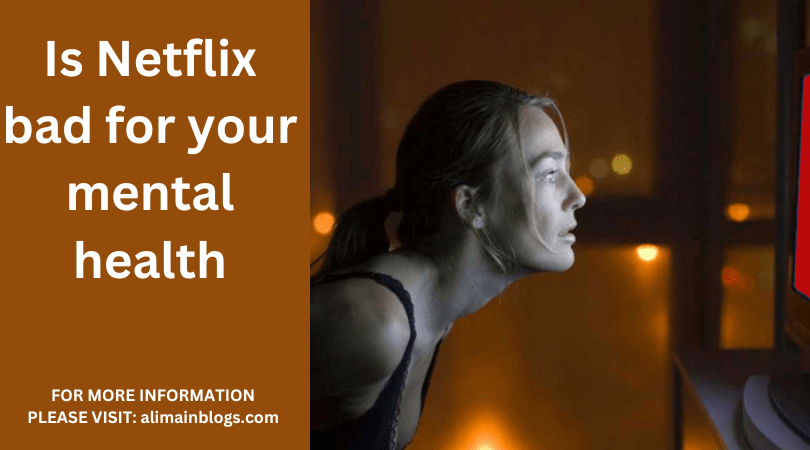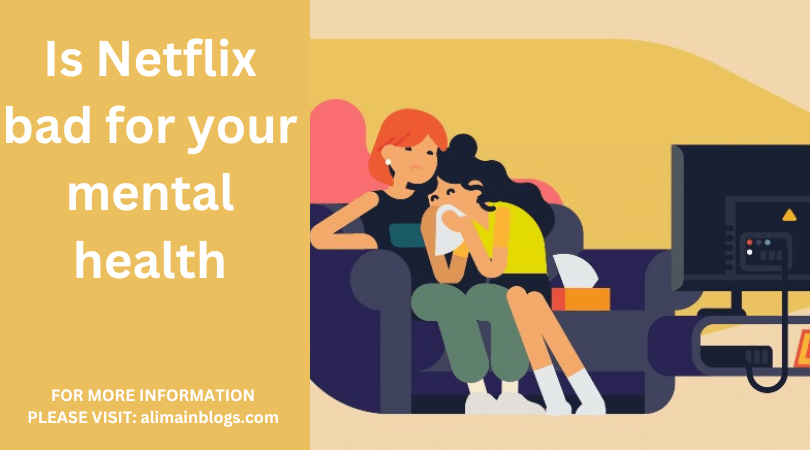Is Netflix bad for your mental health. In contemporary society. Netflix has seamlessly integrated itself into our daily routines, offering an extensive library of entertainment just a click away. Yet, beneath the surface of its convenience and compelling content lies a growing concern about the potential adverse effects of Netflix on mental health.
The Temptation of Binge-Watching:

Netflix’s model, encouraging binge-watching, is associated with various mental health challenges. The temptation of “just one more episode” can lead to disrupted sleep patterns, impacting circadian rhythms and contributing to issues such as anxiety, depression, and cognitive impairment.
Escapism versus Reality:
While entertainment has traditionally served as a means of escapism. Netflix’s immersive content sometimes blurs the lines between fiction and reality. Prolonged sessions of living vicariously through fictional characters can result in detachment from our own lives, hindering the development of genuine relationships and intensifying feelings of loneliness and isolation.
Unrealistic Standards and Social Comparison:
The content on Netflix often portrays idealized lives, settings, and relationships, setting unrealistic standards for viewers. This constant exposure can lead to social comparison, where individuals measure their own lives against exaggerated portrayals on the screen, fostering feelings of inadequacy, low self-esteem, and contributing to mental health challenges.
Sedentary Lifestyle:
The binge-watching culture fosters a sedentary lifestyle, with viewers spending prolonged periods in front of screens. Lack of physical activity is a recognized risk factor for mental health issues, including anxiety and depression. The absence of outdoor engagement and physical movement can contribute to a decline in overall well-being.
The Infinite Scroll:
Netflix’s algorithm, designed to maintain viewer engagement, presents an endless scroll of content tailored to individual preferences. This constant stimulation can lead to decision fatigue, a feeling of being overwhelmed, and heightened stress and anxiety levels. The pressure to keep up with the latest shows can intensify this sense of urgency, further impacting mental health.

While Netflix undoubtedly offers a convenient and enjoyable form of entertainment, it’s crucial to recognize its potential impact on mental health. Binge-watching, exposure to unrealistic standards, and a sedentary lifestyle are factors that may contribute to a decline in overall well-being. Mindful consumption, balancing virtual and real-life experiences, and prioritizing mental health in the digital age are essential practices for navigating the expansive world of streaming services. Understanding the potential risks empowers individuals to make informed choices that prioritize their mental well-being in the midst of evolving digital habits.

Q1: Is watching Netflix excessively bad for mental health?
A1: Excessive binge-watching on Netflix or any other platform can potentially have negative effects on mental health. It may lead to sedentary behavior, lack of social interaction, and disrupted sleep patterns, which can contribute to stress and other mental health issues.
Q2: How does binge-watching on Netflix affect sleep patterns?
A2: Binge-watching, especially late into the night, can disrupt sleep patterns. The blue light emitted from screens interferes with the production of melatonin, a hormone responsible for regulating sleep. This can lead to difficulty falling asleep and poor sleep quality.
Q3: Does Netflix contribute to social isolation? A3: Excessive Netflix consumption can contribute to social isolation if it replaces face-to-face interactions or other social activities. Spending too much time alone watching shows or movies may impact one’s social life and overall well-being.
Q4: Can watching certain content on Netflix trigger mental health issues?
A4: Some content on Netflix may be intense, graphic, or emotionally charged, and excessive exposure to such content could potentially trigger or exacerbate mental health issues, especially in individuals who are sensitive to certain themes.
Q5: Is there a link between Netflix and feelings of depression or anxiety?
A5: While it’s not accurate to attribute depression or anxiety solely to watching Netflix, excessive screen time, lack of physical activity, and social isolation associated with binge-watching can contribute to feelings of depression and anxiety for some individuals.
Q6: Can using Netflix as a form of escapism be harmful?
A6: Using Netflix as a form of escapism occasionally is normal, but relying on it excessively to escape from real-life problems may hinder the development of effective coping mechanisms. This avoidance behavior can contribute to long-term mental health issues.
Q7: How can one use Netflix responsibly for better mental health?
A7: To use Netflix responsibly, it’s essential to set limits on screen time, prioritize physical activity and social interactions, and ensure a healthy sleep routine. Choosing content mindfully and taking breaks between episodes can also contribute to a more balanced and positive viewing experience.
=================
FOR MORE INFORMATION PLEASE VISIT: alimainblogs.com
